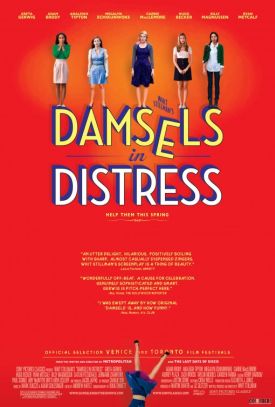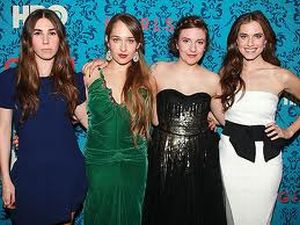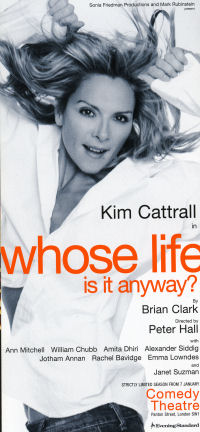Laughing on the Wrong Side
From The American SpectatorLena Dunham (third from left) and the “Girls”
One of the worst things about being a progressive and so being, as progressives like President Obama and Senator Harry Reid have from time to time claimed to be, on “the right side of history” must be that you thus make it impossible for yourself to learn anything from history. If history has a right and a wrong side — if, that is, it follows a course of Marxian inevitability towards the progressive utopia — then any social problems with their attendant miseries that may be thrown up by progress short of that utopian conclusion must simply be endured, pending the millennium. If we are inevitably on our way to somewhere else, then the wisdom of where we have been is no longer relevant and, like our forefathers who discovered and formulated it, badly out of date.
Take, for example, the problem raised by Lee Hirsch’s documentary, Bully. Mr Hirsch’s heart-rending tales of children mercilessly tormented by their coevals at school — two of them are said to have killed themselves as a result — cannot fail to win the audience’s sympathy. All his moral indignation is focused on mealy-mouthed teachers and administrators who, when they are not denying that the problem exists, confess themselves helpless to do anything about it. We share that indignation because we know, at some level, that this is simply not true. It cannot be true. And yet neither Mr Hirsch nor anyone else in his film has anything to suggest they should do about it, apart from getting everyone to join in a progressive, feel-good rally with T-shirts and balloons saying “I hate bullying” or words to that effect.
Older folks, of course, can remember when nearly everyone knew what to do about bullying. If it took place in the presence of a teacher or adult authority figure — as does the only example Mr Hirsch is able to catch in his lens, which takes place on a school bus — then the adult authority figure can take a break from driving or whatever else he may be doing at the time and give the bully a good belt around the ear-hole. If it takes place out of sight of adult authority, as it is quite likely to do when authority is prepared to stop it, then the only thing to be done is to fight back. Or to get a bigger and stronger friend or relation to fight back for you. Even those who are small and overmatched are unlikely to be picked on if they are known to be spirited enough to stand up for themselves — which is the origin of that old and not-quite-true truism that all bullies are cowards.
The only time when this simple and now dreadfully outmoded method of dealing with bullies is mentioned in the film comes from the bigger and stronger friend of Ty Smalley, one of the boys who killed himself. Trey, the friend, is a boy who by his own account used to be a bully himself, and he speaks feelingly to Mr Hirsch’s camera about a time when he had offered to fight back against the bullies tormenting his saint-like friend. But Ty had said to him: “Trey, it’s not worth it. Be better than them.” So Trey was better than them, and Ty died — killed by his own sense of despair and helplessness rather than the bullies. Both boys internalized the progressive imperative to believe that the only thing it was not possible to do was the only thing that their grandparents would have been taught it was possible to do. They will doubtless be remembered, come that wonderful golden future when there shall be no more fighting, among the pacifist heroes who helped to make it happen.
To me, sex is an even more obvious example of how the wisdom of the past is disregarded. It must be disregarded if we are not to forsake our confidence in the benign but inexorable course of history and its utopian conclusion. Like Bully, the new HBO show “Girls” — which is, among other things, a brilliant parody of “Sex and the City” — explores what its characters do not even have the wit to treat as an intractable problem, but with comic rather than tragic results. The show’s author and principal character is a 26-year-old genius named Lena Dunham whose feature-film debut Tiny Furniture (2010) was a sort of prototype for the series and, like it, included some of the most unerotic sex ever portrayed on screen. This is partly because Miss Dunham as the series’ heroine, Hannah Horvath, though actually quite pretty, has a short, pudgy body which she enjoys exhibiting as a kind of token of the kinds of sexual humiliations to which she sees herself as being routinely submitted. These, in turn, stand for the larger, life-humiliations involved in her being unattached, unlovely and virtually unemployable.
In “Girls,” Hannah makes a joke out of her being the voice of her generation — or a voice of a generation — but it’s pretty clear that that’s what her creator is to the chickerati of the media who have been queuing up to interview her. They presumably understand that the appallingly brutish and unromantic sex Hannah enjoys with her loutish boyfriend Adam (Adam Driver) depends entirely for its humor on our knowledge that neither she nor any of her friends has any but the foggiest ideas of anything better. They don’t dare. Having been carefully protected all their lives from the once commonplace understanding of the necessary connection between sex, love and marriage, they never think to connect that connection, or its absence, to everything else that makes their lives so comically miserable.
Miss Dunham, unlike her on-camera self, may know better or she may not. When Tiny Furniture came out, she told Rebecca Mead of The New Yorker that her character in that film was “like me, minus a certain kind of self-awareness. She is one step behind where I’m at, at any given moment.” But one step may not be far enough for her to be ahead. Still, the excruciating humor of “Girls” does not depend on her awareness of historical contingency or the lack of it. It’s clear that her humor only works in a world where it would be simply impossible for anyone to take seriously the notion that sexual continence might have anything to recommend it. Even the excellent new book by Elizabeth Kantor, The Jane Austen Guide to Happily Ever After which gives old-timey style “dating” advice to young girls, daren’t go that far.
 |
Alessandra Stanley of The New York Times writes that “‘Girls’ is unsettling” partly because “it is an acerbic, deadpan reminder that human nature doesn’t change. There was a lot of sex in the ’60s, but not much sexual revolution. For all the talk of equality, sexual liberation and independence, the love lives of these young women are not much more satisfying than those of their grandmothers.” Feminism has taught Ms Stanley thus to take for granted the misery of the “love lives” of the grandmothers — and if the latter have anything to say to correct her assumption, she’s not interested. Revolutions, even not-very- revolutionary ones, have no reverse gear. Ms Stanley is shrewd enough to see that “the depiction of slacker life in New York. . . could easily be interpreted as a cautionary tale written by the religious right,” yet one senses that no one she knows would dream of taking it this way.
To Emily Nussbaum of New York magazine, Lena Dunham listed Whit Stillman as first on her list of influences — just ahead of Woody Allen, Noah Baumbach, Nicole Holofcener, James L. Brooks and Mike Leigh. As it happens, Mr Stillman (Metropolitan, Barcelona, The Last Days of Disco) has a new movie out called Damsels in Distress. It deals with the same sad predicament of young women who, as the feminist-progressive consensus insists, must deny their feminine nature and take the historically male attitude to sex as nothing more than an opportunity for casual amusement. Mr Stillman — who, many years before attaining his present eminence, wrote for The American Spectator — is more obviously aware than Miss Dunham of the extent to which “an atmosphere of male barbarism predominates” on today’s college campuses, for his heroines actually set out to do something about it. They see their task as “a form of youth outreach,” somehow to re-invent courtship, love and romance — and, as in Disco, dancing. Damsels represents a fairy-tale response to the loss of those social rituals to which the sexual revolution so largely put an end. Mr Stillman knows it’s a fantasy, of course: a fantasy of a lost reality which he, quite as much as Miss Dunham, can treat only as an ironic framework for comedy. But as he told me, possibly ironically, when I spoke to him about it, “That’s our whole game of fake irony.” Who knows? Maybe it is Miss Dunham’s game as well.
Discover more from James Bowman
Subscribe to get the latest posts to your email.







